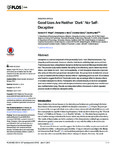Good Liars Are Neither 'Dark' Nor Self-Deceptive.
| dc.contributor.author | Wright, GR | |
| dc.contributor.author | Berry, Christopher | |
| dc.contributor.author | Catmur, C | |
| dc.contributor.author | Bird, G | |
| dc.date.accessioned | 2015-07-10T10:12:23Z | |
| dc.date.available | 2015-07-10T10:12:23Z | |
| dc.date.issued | 2015 | |
| dc.identifier.issn | 1932-6203 | |
| dc.identifier.issn | 1932-6203 | |
| dc.identifier.other | ARTN e0127315 | |
| dc.identifier.uri | http://hdl.handle.net/10026.1/3424 | |
| dc.description.abstract |
Deception is a central component of the personality 'Dark Triad' (Machiavellianism, Psychopathy and Narcissism). However, whether individuals exhibiting high scores on Dark Triad measures have a heightened deceptive ability has received little experimental attention. The present study tested whether the ability to lie effectively, and to detect lies told by others, was related to Dark Triad, Lie Acceptability, or Self-Deceptive measures of personality using an interactive group-based deception task. At a group level, lie detection accuracy was correlated with the ability to deceive others-replicating previous work. No evidence was found to suggest that Dark Triad traits confer any advantage either to deceive others, or to detect deception in others. Participants who considered lying to be more acceptable were more skilled at lying, while self-deceptive individuals were generally less credible and less confident when lying. Results are interpreted within a framework in which repeated practice results in enhanced deceptive ability. | |
| dc.format.extent | e0127315-e0127315 | |
| dc.format.medium | Electronic-eCollection | |
| dc.language | eng | |
| dc.language.iso | eng | |
| dc.publisher | Public Library of Science (PLoS) | |
| dc.subject | Adult | |
| dc.subject | Deception | |
| dc.subject | Female | |
| dc.subject | Humans | |
| dc.subject | Machiavellianism | |
| dc.subject | Male | |
| dc.subject | Narcissism | |
| dc.subject | Personality Inventory | |
| dc.subject | Psychological Tests | |
| dc.subject | Surveys and Questionnaires | |
| dc.title | Good Liars Are Neither 'Dark' Nor Self-Deceptive. | |
| dc.type | journal-article | |
| dc.type | Journal Article | |
| dc.type | Article | |
| plymouth.author-url | https://www.webofscience.com/api/gateway?GWVersion=2&SrcApp=PARTNER_APP&SrcAuth=LinksAMR&KeyUT=WOS:000356567400010&DestLinkType=FullRecord&DestApp=ALL_WOS&UsrCustomerID=11bb513d99f797142bcfeffcc58ea008 | |
| plymouth.issue | 6 | |
| plymouth.volume | 10 | |
| plymouth.publication-status | Published online | |
| plymouth.journal | PloS one | |
| dc.identifier.doi | 10.1371/journal.pone.0127315 | |
| plymouth.organisational-group | /Plymouth | |
| plymouth.organisational-group | /Plymouth/Faculty of Health | |
| plymouth.organisational-group | /Plymouth/Faculty of Health/School of Psychology | |
| plymouth.organisational-group | /Plymouth/REF 2021 Researchers by UoA | |
| plymouth.organisational-group | /Plymouth/REF 2021 Researchers by UoA/UoA04 Psychology, Psychiatry and Neuroscience | |
| plymouth.organisational-group | /Plymouth/Users by role | |
| plymouth.organisational-group | /Plymouth/Users by role/Academics | |
| dc.publisher.place | United States | |
| dcterms.dateAccepted | 2015-04-13 | |
| dc.identifier.eissn | 1932-6203 | |
| dc.rights.embargoperiod | Not known | |
| rioxxterms.versionofrecord | 10.1371/journal.pone.0127315 | |
| rioxxterms.licenseref.uri | http://www.rioxx.net/licenses/all-rights-reserved | |
| rioxxterms.type | Journal Article/Review |


